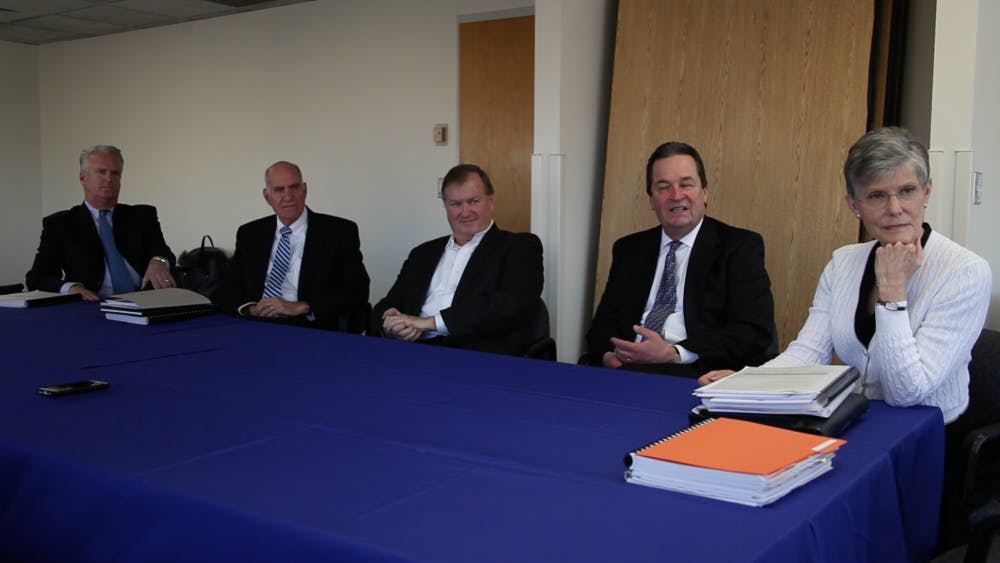It’s a budget year at AU-- and that means that come February, AU’s Board of Trustees will approve a plan that will fund the University for the next two years, 2017-2019.
That plan will touch all corners of campus, covering everything and anyone that requires funding at AU. That includes large, obvious expenditures like faculty salaries and the financial aid pool, and smaller, less-known expenses like club sports, library databases, new student recruitment programs and more.
It’s likely that the next budget will include a tuition increase, according to Violeta Ettle, Vice Provost for Academic Administration and the officer representing all of AU’s academic units during the budget process. Since the board has voted to increase tuition by less than three percent for the past five years, she said it's expected that the next budget will follow that trend. That will increase the University’s funding from the $640,500,000 they are using to operate in 2016-2017, according to Ettle.
“I’ve worked here at the University for many years and I’ve been involved in budget development for a number of cycles and we have not had a year where we had zero increase in tuition,” Ettle said.
The University creates a new spending plan every other year for its operating budget. Like many private universities nationwide, AU is a highly tuition-dependent institution as 81 percent of the budget comes from tuition revenue. As operational costs such as minimum wage, government compliance and faculty salaries rise, tuition must increase to accommodate those expenses, Ettle said.
The Eagle broke down everything students need to know before the planning process gets underway in the coming weeks:
How will the budget process work?
The roughly nine month development of a new budget will begin by September, when President Kerwin appoints the budget committee. In the past, the budget committee has included administrators from different departments on campus, including the Washington College of Law, the Office of Campus Life, Bender Library and more. The committee will meet every two weeks for several months to develop a list of priorities for how the University’s operating dollars will be spent. The priorities will include AU’s strategic plan, which is the University’s growth plan.
The strategic plan’s top priorities include growing the library, increasing the use of technology on campus, strengthening partnerships with DC-area organizations and more. It also includes expanding the school’s facilities, like the University has done with East Campus, and making AU less tuition-dependent through “entrepreneurial ventures,” the plan states.
By late October or early November, the committee will submit its priorities to AU’s Board of Trustees, which is led by Chairman Jack Cassell. The board could change any of the those priorities, such as the range of faculty salary increase, financial aid or tuition increase. Changes are highly unlikely, however, Ettle said. Once the board approves the list of priorities, the committee will create a budget proposal to submit to President Kerwin in December, which he will review with his cabinet, Ettle said. The cabinet includes includes Provost Scott Bass, Chief of Staff David Taylor, Vice President of Campus Life Dr. Gail Hanson, CFO Douglas Kudravetz and other top University officials.
“There will then be several town hall meetings that will be held around the campus to invite students, faculty, staff and everybody who has interest in being involved in the development of the budget, if they have any issues they want to raise to the budget committee,” Ettle said.
Sometime in late January or early February, Kerwin will approve the proposal and forward it to the board of trustees, according to Ettle. He could change the percentage of tuition rate increase or the proportion of the operating budget allocated to certain expenses, and they have done that in the past, Ettle said. He will vote on the final copy during the late February meeting before the budget is distributed to all the schools, divisions and academic units at AU. The new budget will take effect on May 1, 2017.
What can I do to get involved in the budget process?
Students have a hand in many parts of the process, Ettle said. Like in years past, there will be students serving on the budget committee, as in past years. Student Government comptroller Shannon McDermott will represent the undergraduate population on that committee.
According to McDermott, her role involves sitting in on budget committee meetings as a representative of the student body and providing a student perspective on how they want their money to be spent. Although the comptroller doesn’t get to vote on committee decisions, McDermott said she still plans on meeting with students to represent their interests as accurately as possible.
“I plan on meeting with any student leader that wants to,” McDermott said. “I expect students to want more money going to them. For example, more money being funneled into the counseling center but in a way that is effective for students. I don’t want to speak for students yet as to what I think they want, but I’m excited to start talking with them to piece together what the AU community is looking for.”
Additionally, Ettle said that administrators will be holding town hall-style meetings with different “constituencies” on campus, including students, once the budget reaches President Kerwin’s desk in December. Students will be able to attend those meetings and voice their concerns. After that, they can get involved by talking to the student serving on the board of trustees, which is Shyheim Snead, though like McDermott, he also doesn’t get to vote.
Although the process of determining a new budget is determined mainly through administrators, McDermott encouraged students to get involved in the process to make sure their voices are heard.
“I hope that students know that they can always come with issues and concerns, especially in regards to what they want to see the budget looking like,” McDermott said.





